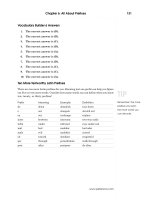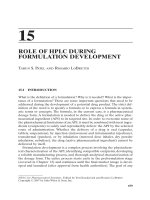The 4000 words essential for an educated vocabulary part 15
Bạn đang xem bản rút gọn của tài liệu. Xem và tải ngay bản đầy đủ của tài liệu tại đây (98.33 KB, 10 trang )
142 Vocabulary 4000
Solutions to Drill I
1. Had the President’s Administration not lost the vote on the budget reduction
package, his first year in office would have been rated an A.
(A) Had the President’s Administration not lost the vote on the budget
reduction package, his first year in office would have been rated an A.
(B) If the Administration had not lost the vote on the budget reduction
package, his first year in office would have been rated an A.
(C) Had the President’s Administration not lost the vote on the budget
reduction package, it would have been rated an A.
(D) Had the President’s Administration not lost the vote on its budget
reduction package, his first year in office would have been rated an A.
(E) If the President had not lost the vote on the budget reduction package,
the Administration’s first year in office would have been rated an A.
Choice (A) is incorrect because his appears to refer to the President,
but the subject of the subordinate clause is the President’s
Administration, not the President.
Choice (B) changes the structure of the sentence, but retains the
same flawed reference.
In choice (C), it can refer to either the President’s
Administration or the budget reduction package. Thus, the refer-
ence is ambiguous.
Choice (D) adds another pronoun, its, but still retains the same
flawed reference.
Choice (E) corrects the flawed reference by removing all
pronouns. The answer is (E).
2. The new law requires a manufacturer to immediately notify their customers
whenever the government is contemplating a forced recall of any of the
manufacturer’s products.
(A) to immediately notify their customers whenever the government is
contemplating a forced recall of any of the manufacturer’s products.
(B) to immediately notify customers whenever the government is
contemplating a forced recall of their products.
(C) to immediately, and without delay, notify its customers whenever the
government is contemplating a forced recall of any of the
manufacture’s products.
(D) to immediately notify whenever the government is contemplating a
forced recall of any of the manufacturer’s products that the customers
may have bought.
(E) to immediately notify its customers whenever the government is
contemplating a forced recall of any of the manufacturer’s products.
Idiom & Usage 143
Choice (A) is incorrect because the plural pronoun their cannot have
the singular noun a manufacturer as its antecedent.
Although choice (B) corrects the given false reference, it
introduces another one. Their can now refer to either customers or
government, neither of which would make sense in this context.
Choice (C) also corrects the false reference, but it introduces a
redundancy: immediately means “without delay.”
Choice (D) corrects the false reference, but its structure is very
awkward. The direct object of a verb should be as close to the verb
as possible. In this case, the verb notify is separated from its direct
object customers by the clause “that the government is
contemplating a forced recall of any of the manufacturer’s products
that.”
Choice (E) is correct because the singular pronoun its has the
singular noun a manufacturer as its antecedent. The answer is (E).
3. World War II taught the United States the folly of punishing a vanquished
aggressor; so after the war, they enacted the Marshall Plan to rebuild
Germany.
(A) after the war, they enacted the Marshall Plan to rebuild Germany.
(B) after the war, the Marshall Plan was enacted to rebuild Germany.
(C) after the war, the Marshall Plan was enacted by the United States to
rebuild Germany.
(D) after the war, the United States enacted the Marshall Plan to rebuild
Germany.
(E) after the war, the United States enacted the Marshall Plan in order to
rebuild Germany.
Choice (A) is incorrect. Since United States is denoting the
collective country, it is singular and therefore cannot be correctly
referred to by the plural pronoun they.
Choice (B) is not technically incorrect, but it lacks precision
since it does not state who enacted the Marshall Plan. Further, it
uses a passive construction: “was enacted.”
Choice (C) states who enacted the Marshall Plan, but it retains
the passive construction “was enacted.”
Choice (E) is second-best. The phrase “in order” is
unnecessary.
Choice (D) corrects the false reference by replacing they with
the United States. Further, it uses the active verb enacted instead of
the passive verb was enacted. The answer is (D).
144 Vocabulary 4000
4. In the 1950’s, integration was an anathema to most Americans; now,
however, most Americans accept it as desirable.
(A) to most Americans; now, however, most Americans accept it as
desirable.
(B) to most Americans, now, however, most Americans accept it.
(C) to most Americans; now, however, most Americans are desirable of it.
(D) to most Americans; now, however, most Americans accepted it as
desirable.
(E) to most Americans. Now, however, most Americans will accept it as
desirable.
The sentence is not incorrect as written. Hence, the answer is choice
(A).
Choice (B) creates a run-on sentence by replacing the
semicolon with a comma. Without a connecting word—and, or, but,
etc.—two independent clauses must be joined by a semicolon or
written as two separate sentences. Also, deleting “as desirable”
changes the meaning of the sentence.
Choice (C) uses a very awkward construction: are desirable of
it.
Choice (D) contains an error in tense. The sentence progresses
from the past to the present, so the verb in the second clause should
be accept, not accepted.
Choice (E) writes the two clauses as separate sentences, which
is allowable, but it also changes the tense of the second clause to the
future: will accept.
5. Geologists in California have discovered a fault near the famous San
Andreas Fault, one that they believe to be a trigger for major quakes on the
San Andreas.
(A) one that they believe to be a trigger for
(B) one they believe to be a trigger for
(C) one that they believe triggers
(D) that they believe to be a trigger for
(E) one they believe acts as a trigger for
Choice (A) is incorrect since the relative pronoun that is redundant:
the pronoun one, which refers to the newly discovered fault, is
sufficient.
Although choice (C) reads more smoothly, it still contains the
double pronouns.
Idiom & Usage 145
Choice (D) is incorrect. Generally, relative pronouns such as
that refer to whole ideas in previous clauses or sentences. Since the
second sentence is about the fault and not its discovery, the pronoun
that is appropriate.
Choice (E) is very tempting. It actually reads better than choice
(A), but it contains a subtle flaw. One is the direct object of the verb
believes and therefore cannot be the subject of the verb acts. Since
they clearly is not the subject, the verb acts is without a subject.
Choice (B) has both the correct pronoun and the correct verb
form. The answer is (B).
6. A bite from the tsetse fly invariably paralyzes its victims unless an antidote
is administered within two hours.
(A) its victims unless an antidote is administered
(B) its victims unless an antidote can be administered
(C) its victims unless an antidote was administered
(D) its victims unless an antidote is administered to the victims
(E) its victims unless they receive an antidote
Choice (A) is incorrect since it is unclear whether the victim or the
fly should receive the antidote.
Choice (B) is incorrect since is is more direct than can be.
Choice (C) is incorrect. A statement of fact should be
expressed in the present tense, not the past tense.
Choice (D) is wordy. A pronoun should be used for the phrase
the victims.
Choice (E) is the answer since they correctly identifies who
should receive the antidote.
146 Vocabulary 4000
Solutions to Drill II
1. The rising cost of government bureaucracy have made it all but impossible
to reign in the budget deficit.
(A) The rising cost
(B) Since the rising costs
(C) Because of the rising costs
(D) The rising costs
(E) Rising cost
Choice (A) is incorrect because the plural verb have does not agree
with its singular subject the rising cost.
Both (B) and (C) are incorrect because they turn the sentence
into a fragment.
Choice (E) is incorrect because rising cost is still singular.
Choice (D) is the correct answer since now the plural verb have
agrees with its plural subject the rising costs.
2. In a co-publication agreement, ownership of both the material and its means
of distribution are equally shared by the parties.
(A) its means of distribution are equally shared by the parties.
(B) its means of distribution are shared equally by each of the parties.
(C) its means of distribution is equally shared by the parties.
(D) their means of distribution is equally shared by the parties.
(E) the means of distribution are equally shared by the parties.
Choice (A) is incorrect. Recall that intervening phrases have no
effect on subject-verb agreement. In this sentence, the subject
ownership is singular, but the verb are is plural. Dropping the
intervening phrase clearly shows that the sentence is ungrammatical:
In a co-publication, agreement ownership are equally
shared by the parties.
Choice (B) is incorrect. Neither adding each of nor inter-
changing shared and equally addresses the issue of subject-verb
agreement.
Choice (D) contains a faulty pronoun reference. The antecedent
of the plural pronoun their would be the singular noun material.
Choice (E) is incorrect since it still contains the plural verb are.
The answer is choice (C).









